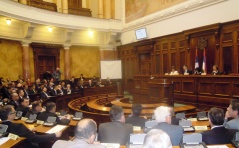National Assembly of the Republic of Serbia / Activities / Activity details

14 February 2013 The participants of the public hearing on the Political and Other Rights of Serbs in the Region
Thursday, 14 February 2013
National Assembly House Hosts Public Hearing on Political and Other Rights of Serbs in the Region
Yesterday, the National Assembly House hosted a public hearing on the topic “Political and Other Rights of Serbs in the Region”, organised by the Committee on the Diaspora and Serbs in the Region.
The public hearing was opened by the Committee Chairman, Aleksandar Cotric, who said that the Committee had got in touch with all the representatives of the diaspora and their associations with whom it enjoys good cooperation. Cotric added that the fact that the number of people declaring themselves as Serbian citizens is on the decline, especially due to assimilation and other problems faced by Serbs in the region, is worrying and that today’s public hearing is dedicated to exchanging ideas which could help the Serbian people in the region to exercise their rights.
The participants were also greeted by National Assembly Deputy Speaker Nenad Popovic who stressed that in certain states Serbs are not guaranteed even basic rights and that it is Serbia’s duty to protect the Serbian population. He also reminded of the problem of the Serbian population in Croatia where the situation is the direst and where a great many Serbs lack the right to pension.
Zarko Obradovic, Minister of Education, Science and Technological Development, said that there are fewer Serbs in the countries of the region than there are members of minorities in Serbia. It is heartening to hear that Serbia provides elementary schooling in eight minority languages, and high-school education in five, and that the national councils help the minorities to exercise their rights, added Obradovic.
Slavka Draskovic, Director of the Office for Cooperation with the Diaspora and Serbs in the Region, addressed the participants saying that 1,916,030 Serbs are currently living outside of Serbia, but about two hundred thousand Serbs are unable to publicly claim their Serbian nationality for many reasons. Draskovic added that the Law on the Diaspora and Serbs in the Region had recently been passed, the Council for Serbs in the Region and Fund for Serbs in the Region had been founded, but lack of budget funds remained the biggest problem.
Marko Djuric, counsellor to the President of the Republic of Serbia, stressed that the attitude toward Serbs in the region represents the attitude toward us. Serbs in the region have often been victims of political conflicts which is an issue that should be a national issue, added Djuric.
Juerg Staudenmann, Deputy Resident Representative of the United Nations Development Programme (UNDP), said that Serbia can do a lot for its fellow-nationals, emphasising the importance of the control function to show whether the rights of minorities are respected.
The President of the Republic of Srpska, Milorad Dodik, greeted the participants and proposed that the Serbian authorities draft a “white book” on the situation as regards the rights of Serbs in the region and that Serbia should amend its Citizenship Law and, like Croatia and Hungary, automatically grant citizenship to its nationals living outside of its borders.
The representatives of the Serbian diaspora listed the problems they face daily such as receiving education in their own language, publishing, emphasising that in some countries they do not even enjoy the status of national minority.
MPs Miodrag Linta, Marko Atlagic and Neven Cveticanin reminded of the problem of exercising the right to a pension in the Republic of Croatia, the problem of exiled Serbs and those whose rights have been in some way violated, and stressed the necessity to achieve such a level where the national minority will not feel like a minority.
Committee Chairman Aleksandar Cotric commended the response of the invited individuals and organisations, stressing that this public hearing had the largest number of participants and that the information on the public hearing would be distributed to the participants, the National Assembly Speaker and all relevant associations and organisations.
The Committee on the Diaspora and Serbs in the Region had organised the public hearing in collaboration with the Office for Cooperation with the Diaspora and Serbs in the Region of the Government of the Republic of Serbia and the support of the UNDP project financed by the Swiss Agency for Development and Cooperation.




